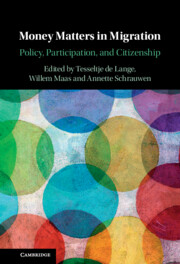Book contents
- Money Matters in Migration
- Money Matters in Migration
- Copyright page
- Contents
- Notes on Contributors
- 1 Money Matters in Migration: A Synthetic Approach
- Part I Migration
- 2 The Changing Landscape of Multilateral Financing and Global Migration Governance
- 3 Digging a Moat around Fortress Europe: EU Funding as an Instrument of Exclusion
- 4 The “Refugee Hospital”. Aid Money, Migration Politics, and Uncertain Care in Neoliberal Morocco
- 5 Cash Rules Everything: Money and Migration in the Colombian-Venezuelan Borderlands
- 6 Recruitment Fees, Indebtedness, and the Impairment of Asian Migrant Workers’ Rights
- 7 Pushing Out the Poor: Unstable Income and Termination of Residence
- 8 Follow the Money: Income Requirements in Norwegian Immigration Regulations
- Part II Participation
- Part III Citizenship
- Index
- References
2 - The Changing Landscape of Multilateral Financing and Global Migration Governance
from Part I - Migration
Published online by Cambridge University Press: 12 November 2021
- Money Matters in Migration
- Money Matters in Migration
- Copyright page
- Contents
- Notes on Contributors
- 1 Money Matters in Migration: A Synthetic Approach
- Part I Migration
- 2 The Changing Landscape of Multilateral Financing and Global Migration Governance
- 3 Digging a Moat around Fortress Europe: EU Funding as an Instrument of Exclusion
- 4 The “Refugee Hospital”. Aid Money, Migration Politics, and Uncertain Care in Neoliberal Morocco
- 5 Cash Rules Everything: Money and Migration in the Colombian-Venezuelan Borderlands
- 6 Recruitment Fees, Indebtedness, and the Impairment of Asian Migrant Workers’ Rights
- 7 Pushing Out the Poor: Unstable Income and Termination of Residence
- 8 Follow the Money: Income Requirements in Norwegian Immigration Regulations
- Part II Participation
- Part III Citizenship
- Index
- References
Summary
The United Nations (UN) charter did not include voluntary contributions because some feared it would undermine multilateralism. Since the 1990s, UN agencies have increasingly been financed through earmarked contributions from a diverse set of donors. A growing body of literature examines the relationship between funding and global governance. This chapter examines the role that money has played in the origin and evolution of the International Organization for Migration (IOM) as a case study of earmarking in the wider UN system. The chapter uses a new dataset of earmarked contributions to IOM to examine thematic and temporal patterns in the contributions of main donors. Contributions have largely focused on issues relating to migration management that reflect the specific interests of donors, lending weight to the argument that the earmarking of financing has allowed bilateral interests to dominate multilateral responses. On the other hand, earmarked funding has also allowed the international community to extend protection to displaced populations not covered by the refugee convention as well as to push forward migration, often a contentious issue, at the international level.
- Type
- Chapter
- Information
- Money Matters in MigrationPolicy, Participation, and Citizenship, pp. 19 - 37Publisher: Cambridge University PressPrint publication year: 2021
References
- 5
- Cited by

